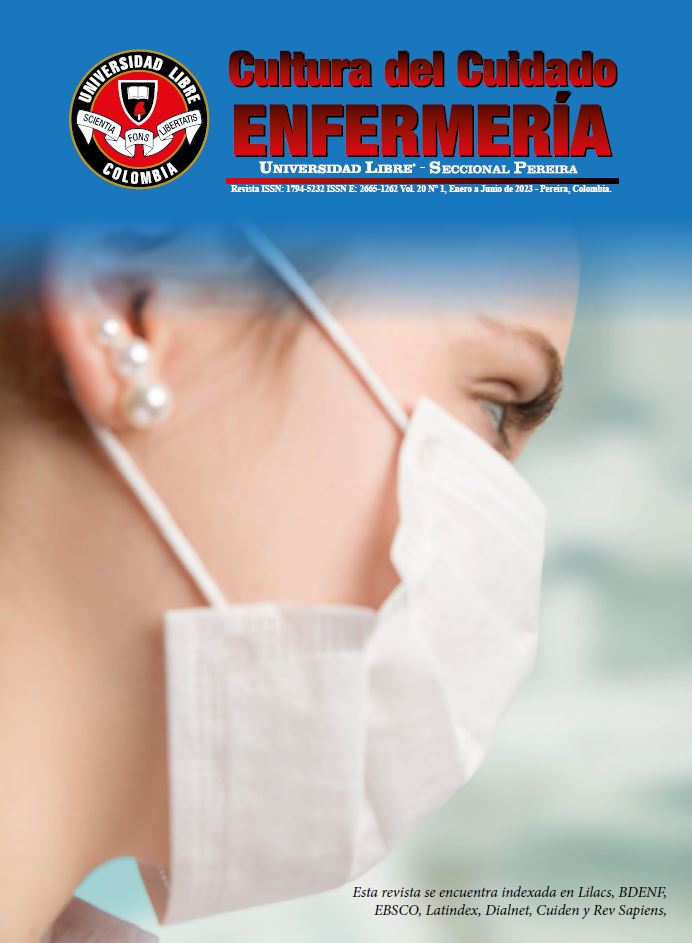Sentido de autoeficacia y demandas ocupaciones en estudiantes de básica primaria
DOI:
https://doi.org/10.18041/1794-5232/cultrua.2023v20n1.10784Palavras-chave:
Tiempo, secuenciación, rutinas, autoeficaciaResumo
Objetivo
Determinar el sentido de autoeficacia y su influencia en las demandas ocupacionales (secuenciación y tiempo) en estudiantes de básica primaria.
Metodología
A través de un enfoque cuantitativo con un alcance de tipo descriptivo correlacional, entrevistando a 30 estudiantes de una institución privada del municipio de Pamplona, en las edades de 5 a 11 años.
Resultados
Para dar respuesta a la relación entre sentido de autoeficacia y demandas ocupacionales se aplicó una ficha sociodemográfica y el instrumento de Autoevaluación ocupacional para niños COSA, permitiendo obtener características específicas y datos en cuanto a la autoeficacia y las rutinas de los escolares. Según esta investigación un porcentaje considerable de los estudiantes presentan dificultades para mantener atención y concentración, en la participación y las habilidades sociales, desmotivación, falta de interés, cansancio, agotamiento, somnolencia, estrés, falta de equilibrio y autocontrol, desestructuración de rutinas que repercuten en la ejecución de las actividades de la vida diaria, participación en ocupaciones, en el desempeño y rendimiento académico.
Conclusiones
Se realizó caracterización a 30 estudiantes, identificando características sociales, económicos y culturales, encontrando en los usuarios desestructuración y organización de hábitos y rutinas, interfiriendo de esta forma en el ocio y tiempo libre y así mismo motivación para llevar a cabo actividades de la vida diaria y académicas.
Downloads
Referências
American Occupational Therapys Asociation. Marco de Trabajo para la Práctica de Terapia Ocupacional: Dominio y Proceso. 2020.
Albert B. Autoeficacia: Cómo afrontamos los cambios de la sociedad actual. Desciée de Brouver; 1995.
De educación y formación profesional M. Informe PISA 2018 [Internet]. Programa para la Evaluación Internacional de los Estudiantes. 2018 [citado el 11 de invierno de 2022]. Disponible en: https://www.observatoriodelainfancia.es/ficherosoia/ documentos/5943_d_InformePISA2018-Espana1.pdf
De las Heras de Pablo CG. Modelo de ocupación humana. editorial síntesis; 2015.
De Ocupación Humana M. autoevaluación ocupacional del niño (COSA) [Internet]. Terapia Ocupacional USAL. 2017 [citado el 11 de invierno de 2022]. Disponible en: https://terapiaocupacionalsalamanca.blogspot.com/2017/06/autoevaluacion- ocupacional-del-nino-cosa.html
Equipo Editorial, Etece. Técnicas de investigación [Internet]. Concepto. 2022 [citado el 11 de 2022]. Disponible en: https://concepto.de/tecnicas-de-investigacion/
Estadísticas de Deserción - Sistemas información [Internet]. Gov.co. [citado el 24 de noviembre de 2022]. Disponible en: https://www.mineducacion.gov.co/ sistemasdeinformacion/1735/w3-article-357549.html?_noredirect=1
Glinys Janeth Guardias Arrieta, Magda Milena Contreras Jáuregui, Rafael Arturo Orozco Medina, editor. Relación ocupacional del desempeño escolar y videojuegos en estudiantes de 8 a 10 años de edad. Vol. 10. Revista virtual ciencia y salud; 2018.
Hernández Sampieri. Metodología de la investigación. Colina Mcgraw; 2014.
Kielhofner G. Modelo de Ocupación Humana Teoría y Aplicación. Editorial Médica Panamericana; 2002.
Maldonado Gelder M. LRZM. : Autoconcepto, autoeficacia y percepción de calidad de vida en niños y niñas con y sin déficit de procesamiento sensorial. Revista virtual ciencia y salud. 2020; 20:1–12.
12. Ministerio de educación nacional. Preescolar, básica y media [Internet]. Ministerio de educación nacional. 2021 [citado el 11 de invierno de 2022]. Disponible en: https:// www.mineducacion.gov.co/portal/Preescolar-basica-y-media/
13. Morales OB. Comité de ética en investigación [Internet]. Sitio Web del Comité de ética en investigación. [Citado el 24 de noviembre de 2022]. Disponible en: https://www. incmnsz.mx/opencms/contenido/investigacion/comiteEtica/helsinki.html





